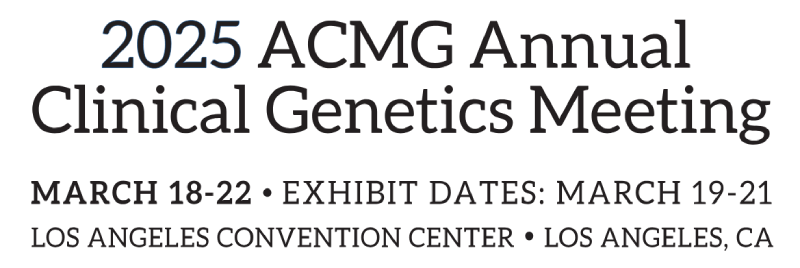Importance of expanded prenatal carrier screening in infertile patients
Prenatal Genetics
-
Primary Categories:
- Prenatal Genetics
-
Secondary Categories:
- Prenatal Genetics
Introduction
Expanded carrier screening is an important part of the pre-fertility treatment workup and can lead to unexpected additional findings.
Case Presentation
A 32 year old nulligravid woman with 1.5 year history of infertility had a medium (17 gene) expanded prenatal carrier screening (ECS) panel drawn by a local fertility clinic.The results found that she was a carrier for three X-linked recessive disorders and the patient was referred for genetic counseling.The genetic counselor determined that all three genes were in the same area of the X chromosome making it likely that the patient was deleted for part of her X chromosome and had a contiguous gene deletion syndrome.
ECS test found that the patient was deleted for:
Diagnostic Workup
Both chromosome analysis and chromosome microarray analysis were ordered. Results: abnormal karyotype (female) 46,X,del(X)(q26); abnormal microarray (female) Xq26.2q28 deletion, pathogenic, copy number change Xq26.2q28 loss, 24.0 Mb.
Treatment and Management
Patient had genetic counseling regarding implications of Xq deletion and was informed of option of preimplantation genetic testing for chromosome aneuploidy (PGT-A).
Outcome and Follow-Up
Patient planned to undergo IVF with embryo transfer after PGT-A.
Discussion
Katoh K et al (2020) reported on two female patients with Xq27-28 deletions who are more significantly affected.One patient had skewed X chromosome inactivation with 79% of cells having the normal X as inactive, and the other patient showed random XCI (55% of cells with normal X inactive).Both patients had global developmental delays, craniofacial dysmorphism, absent speech, hypotonia and CNS malformations (enlarged ventricles), but no mucopolysaccharides in the urine.We hypothesize that due to skewed XCI, our patient does not have any clinical features except for primary infertility.
Conclusion
If the fertility clinic had only ordered ACOG (Opinion 691, 2017) recommended cystic fibrosis and spinal muscular atrophy plus hemoglobinopathy screening or ACMGG (Gregg 2021) tier 1 or tier 2 carrier screening, then this patient’s chromosome deletion would have been unrecognized. Only ACMGG tier 3 or tier 4 carrier screening would identify this patient’s “carrier” status for several X-linked disorders and lead to her correct diagnosis with an X chromosome deletion which has major implications for her fertility treatment, reproductive risks and availability of PGT-A and/or prenatal diagnosis.
References:
Expanded carrier screening is an important part of the pre-fertility treatment workup and can lead to unexpected additional findings.
Case Presentation
A 32 year old nulligravid woman with 1.5 year history of infertility had a medium (17 gene) expanded prenatal carrier screening (ECS) panel drawn by a local fertility clinic.The results found that she was a carrier for three X-linked recessive disorders and the patient was referred for genetic counseling.The genetic counselor determined that all three genes were in the same area of the X chromosome making it likely that the patient was deleted for part of her X chromosome and had a contiguous gene deletion syndrome.
ECS test found that the patient was deleted for:
- X-linked adrenal leukodystrophy (ABCD1 gene) exons 1-6 deleted (exons 7-10 not assessed)
- Mucopolysaccharidosis, type II, Hunter syndrome (IDS gene), entire gene deleted
- X-linked myotubular myopathy, MTM1 gene, entire gene/exons 2-15 deleted
- Possible carrier for fragile X syndrome—although 29 CGG repeats were identified in FMR1 gene, which is in the non-carrier range, no second fragile X allele was found. Testing could not determine if patient has two fragile X genes both with 29 CGG repeats or is deleted with only one fragile X gene.
Diagnostic Workup
Both chromosome analysis and chromosome microarray analysis were ordered. Results: abnormal karyotype (female) 46,X,del(X)(q26); abnormal microarray (female) Xq26.2q28 deletion, pathogenic, copy number change Xq26.2q28 loss, 24.0 Mb.
Treatment and Management
Patient had genetic counseling regarding implications of Xq deletion and was informed of option of preimplantation genetic testing for chromosome aneuploidy (PGT-A).
Outcome and Follow-Up
Patient planned to undergo IVF with embryo transfer after PGT-A.
Discussion
Katoh K et al (2020) reported on two female patients with Xq27-28 deletions who are more significantly affected.One patient had skewed X chromosome inactivation with 79% of cells having the normal X as inactive, and the other patient showed random XCI (55% of cells with normal X inactive).Both patients had global developmental delays, craniofacial dysmorphism, absent speech, hypotonia and CNS malformations (enlarged ventricles), but no mucopolysaccharides in the urine.We hypothesize that due to skewed XCI, our patient does not have any clinical features except for primary infertility.
Conclusion
If the fertility clinic had only ordered ACOG (Opinion 691, 2017) recommended cystic fibrosis and spinal muscular atrophy plus hemoglobinopathy screening or ACMGG (Gregg 2021) tier 1 or tier 2 carrier screening, then this patient’s chromosome deletion would have been unrecognized. Only ACMGG tier 3 or tier 4 carrier screening would identify this patient’s “carrier” status for several X-linked disorders and lead to her correct diagnosis with an X chromosome deletion which has major implications for her fertility treatment, reproductive risks and availability of PGT-A and/or prenatal diagnosis.
References:
- Gregg AR, Aarabi M, Klugman S, Leach NT, et al; ACMG Professional Practice and Guidelines Committee. Screening for autosomal recessive and X-linked conditions during pregnancy and preconception: a practice resource of the American College of Medical Genetics and Genomics (ACMG). Genet Med. 2021 Oct;23(10):1793-1806. doi: 10.1038/s41436-021-01203-z. Epub 2021 Jul 20. Erratum in: Genet Med. 2021 Aug 27;: PMID: 34285390; PMCID: PMC8488021.
- Katoh K, Aiba K, Fukushi D, Yoshimura J, Suzuki Y, Mitsui J, Morishita S, Tuji S, Yamada K, Wakamatsu N. Clinical and molecular genetic characterization of two female patients harboring the Xq27.3q28 deletion with different ratios of X chromosome inactivation. Hum Mutat. 2020 Aug;41(8):1447-1460. doi: 10.1002/humu.24058. Epub 2020 Jun 19. PMID: 32485067.
- Committee Opinion No. 691: Carrier Screening for Genetic Conditions. Obstet Gynecol. 2017 Mar;129(3):e41-e55. doi: 10.1097/AOG.0000000000001952. PMID: 28225426.



)
)
)
)
)
)
)
)
)
)
)
)
)
)
)
)
)
)
)
)